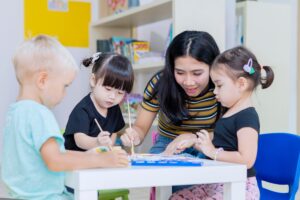BACK
Why Your Child Shouldn’t Skip Kindergarten Education
As parents, we are constantly navigating decisions that shape our children’s futures, and one of the choices we face revolves around their early education. You might wonder whether they should skip kindergarten, thinking they’d be better off at home. Kindergarten is not just a place for learning.
Kindergarten is a crucial juncture that shapes their social and emotional development, too. Read on to find out more.
Foundation for learning
Kindergarten serves as the stepping stone for your child’s educational journey. It’s not merely a place where children learn their ABCs and 123s; it lays the groundwork for a lifelong love of learning. This early exposure to structured education helps develop essential skills and attitudes that will prove invaluable.
Children are taught reading, writing, and arithmetic in a playful and engaging way in kindergarten. Kindergarten helps build a solid academic foundation and fosters a positive attitude towards learning. Skipping this crucial stage might deprive your child of the fundamental skills and enthusiasm essential for educational success.
Language and communication skills
Language development is critical in early childhood, and kindergarten can hone a child’s skills in language and communication. Children are exposed to rich language in this environment, helping them expand their vocabulary, improve verbal expression, and develop effective communication skills.
Kindergarten also provides opportunities for children to engage in storytelling, participate in group discussions, and express their thoughts and ideas. These activities contribute significantly to language development and help build the foundation for effective communication in the future.
Beyond academics, kindergarten is pivotal in shaping a child’s social and emotional development. In this setting, children learn to interact with their peers, share, take turns, and develop a sense of empathy. These early social skills are vital for building positive relationships later in life.
Kindergarten provides a supportive environment for children to express themselves, navigate conflicts, and understand the importance of teamwork. Skipping this phase could result in a child missing out on critical social experiences that contribute significantly to their emotional intelligence and ability to adapt to social situations.
Cognitive development
A child’s cognitive development is at its peak during the early years, and kindergarten is designed to harness this potential. Through age-appropriate activities and games, children are exposed to various cognitive challenges that stimulate their thinking and problem-solving abilities.
Kindergarten activities are carefully crafted to enhance memory, attention span, and creativity. These mental exercises are essential for laying the groundwork for more advanced learning in later years. Skipping kindergarten might mean missing out on this crucial period of cognitive growth.
Structured learning environment
One of the key advantages of kindergarten is the introduction of a structured learning environment. This setting balances free play and structured activities, teaching children the importance of following routines and instructions.
The structured nature of kindergarten helps children develop life skills such as time management, organisation, and self-discipline. These skills are beneficial for academic success and lay the groundwork for future responsibilities and challenges.
Preparation for primary school
Kindergarten is a gentle transition from the informal learning of preschool to the more structured primary school environment. Skipping this phase could leave your child unprepared for the demands of formal education in Singapore, potentially leading to difficulties adjusting to the routines and expectations of primary school.
The kindergarten experience equips children with the skills necessary for a smooth transition, including listening attentively, following instructions, and engaging in cooperative learning. These skills are invaluable as they enter the more structured and academically focused primary school environment.
Early detection of learning challenges
Kindergarten teachers in Singapore are trained to observe and assess a child’s development. Their training includes academic progress and social, emotional, and behavioural aspects. Detecting any potential learning challenges at an early stage allows for timely intervention and support.
Skipping kindergarten may result in missing out on these crucial assessments, potentially delaying identifying and addressing any learning difficulties. Early detection and intervention ensure children receive the necessary support to overcome challenges and thrive academically.
Learning for Success at Little Skool-House
Skipping kindergarten education is a decision that could have long-lasting implications for your child’s overall development and future success in school. The foundational skills, social experiences, and cognitive growth fostered in kindergarten provide a solid platform for academic achievement and personal growth.
At Little Skool-House, we are committed to ensuring that every child receives the best start to their educational journey. Our kindergarten curriculum is designed to nurture each child holistically, fostering academic, social, and emotional growth.
With our blended curriculum, your child will not only develop their literacy skills but get the chance to explore their interests in art, music, sports and STEM. Our curriculum also emphasises relationship-building, so that your child can learn how to communicate with others and enhance their overall well-being.




Social and emotional development